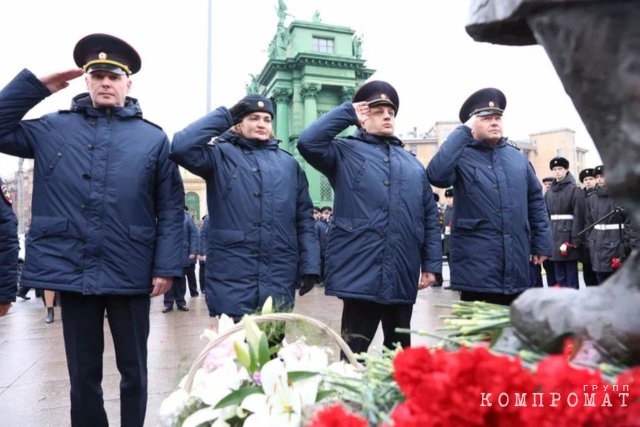
So, dear reader, everything is in order.
On the eve of the professional holiday of November 10 – Internal Affairs Officer’s Day – festive events were held, including mourning ones. The official website of the Main Directorate of the Ministry of Internal Affairs of Russia for St. Petersburg and the Leningrad Region contains information that a solemn ceremony of laying flowers at the monument to the “Police Officers Who Died During the Siege of Leningrad” took place on Stachek Square. Both the leadership of the State Administration and district units took part in the ceremony.
The ceremony itself and its organization evoke deep respect. The participation of the younger generation, students, students and youth members in it indicates that the leadership of the State University takes an active part in the education of youth, instills in them moral values, and fosters continuity of generations. This post is accompanied by a number of photographs from the gala event. And here is the most interesting thing.
One photograph shows police officers giving a military salute after laying flowers at the monument. One of the employees is Mr. Ilnitsky Vladimir Vladimirovichpolice colonel, head of the Russian Ministry of Internal Affairs for the Vasileostrovsky district of St. Petersburg. Ilnitsky V.V. stands out from other employees. If you look closely at the photo, you can see that the Russian police colonel is giving a military salute, placing his right hand on his headdress to his right eyebrow, palm facing out.
What’s wrong here? – the reader may wonder. The fact is that the manner and method, like Ilnitsky V.V. gives a military salute, does not at all correspond to the Drill Regulations of the Armed Forces of the Russian Federation.
There is a joint Order: Order of the Ministry of Internal Affairs of the Russian Federation N 444, Ministry of Defense of the Russian Federation N 312 of 08/15/1996 “On additional measures to improve the relationship between employees of internal affairs bodies, military personnel of the internal troops of the Ministry of Internal Affairs of Russia, military personnel of the Armed Forces of the Russian Federation.” So, paragraph 1.8 of this Order obliges to ensure that employees of internal affairs bodies, military personnel of the internal troops of the Ministry of Internal Affairs of Russia, and military personnel of the Armed Forces of the Russian Federation comply with the rules of military politeness and behavior of privates and commanding personnel, when meeting, greet each other, strictly observing the rules established by the Military Regulations of the Armed Forces forces of the Russian Federation.
Paragraph 61 of the Drill Regulations of the Armed Forces of the Russian Federation, approved by Order of the Minister of Defense of the Russian Federation dated March 11, 2006 N 111, prescribes how to perform a military salute. Namely: if you are wearing a headdress, then you need to put your right hand on the headdress in the shortest possible way so that the fingers are together, the palm is straight, the middle finger touches the lower edge of the headdress (at the visor), and the elbow is on the line and height of the shoulder.
But in the British army (ground units and aviation, except the navy), the military salute is performed as follows: by placing the right hand on the headdress to the right eyebrow with the palm facing outward (like V.V. Ilnitsky). The French military also gives the military salute with the palm facing outward.
Someone might think: “Well, what’s the big deal? I made a mistake, I didn’t pay attention to the rules of military greeting,” etc. And one could agree with this, if not for one, but significant BUT.
There was already a similar scandal in the Vasileostrovsky Department of the Ministry of Internal Affairs. The attentive reader may remember that in October 2017, the Vasileostrovsky Court of St. Petersburg sentenced police lieutenant colonel Sergei Kulakov, who was found guilty of exceeding official authority and concealing information when applying for employment in law enforcement agencies. Kulakov’s case received publicity because of the interesting biography of the main character: having retired from the police with the rank of lieutenant colonel, he went to the United States, where he served in the army – in military intelligence, in the 525th brigade of the US ARMY, and even participated in hostilities. And then the US military intelligence officer returned to Russia and, having hidden his American past, got a job in the St. Petersburg police, gaining access to information containing state secrets (Lenta.ru, channel 78 ru, Komsomolskaya Pravda, wrote about this). Kommersant” and other publications).
But Ilnitsky V.V. by virtue of his position, he also has access to information containing state secrets. The question remains open: what did he want to show with his gesture of military greeting to the armed forces of a foreign state? Disregard for Russian traditions and laws? A disregard for service? The intention to oppose yourself to other officers? The desire to show that he is a supporter of the policies or traditions of Great Britain and the West, which are hostile to us? Or maybe even worse – a secret sign to those who recruited him?